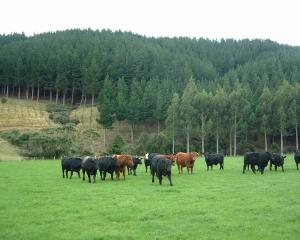
As newsreaders prepared the North Island for Cyclone Gabrielle’s imminent arrival, Hastings apple orchardists Gemma and Andrew Douglas cursed the timing, due to arrive on harvest day.
Mrs Douglas grew up in Southland and Otago, she studied at the University of Otago and played netball for Southern Sting in her early 20s. A qualified teacher, she met her now husband Andrew while living in Auckland and moved to his family orchard at Twyford near Hastings eight years ago. She now runs an online wellbeing business as well as working on the orchard and keeps busy with their three primary school-aged children.

‘‘We were seeing the forecast and we thought we might get a few snapped branches and a fair bit of dropped fruit, not ideal by any stretch, but also not the end of the world,’’ she said.
What played out over the course of 48 hours was worse than they could have imagined but they consider themselves luckier than most as there was still fruit to pick.
The couple own and lease 38ha of apple orchards spread out across four locations in Twyford. Two hectares of their top-end premium export apple trees were completely decimated; all of the trellised rows snapped at the base of the trunk and a further 8ha was swallowed up by floodwaters and silt.
‘‘From what’s left, there is still fruit that is salvageable. We can’t pick anything that has been submerged in water, but we can pick 30cm above that and the exporters are wanting it. So we consider ourselves very fortunate.’’
The speed of the rising water haunted Mrs Douglas and she felt grateful she received a text message from her neighbour to evacuate the area before the Ngaruroro River overflowed the flood bank. ‘‘I was inside our house with the kids and Andrew was out helping some people when I got a text from a friend saying there was word the river’s flood bank which backs on to our orchard might go so, I reluctantly took our kids up to Andrew’s parents’ house. I didn’t really want to leave the comfort of our home and in hindsight I was quite blase about the whole thing.’’

‘‘We can’t believe our house missed the deluge when friends just down the road have had it a whole lot worse. If you drive five minutes in either direction, it’s a very different story. It’s quite an unsettling feeling of guilt, knowing how lucky we have been, compared to so many others.’’
Mr Douglas said by the time the call came through from Civil Defence for their area to evacuate he was standing in waist-deep water in the orchard.
‘‘It just happened so quickly for so many, and they didn’t have time to get out.’’
Like everyone else, the couple spent the first few days following the cyclone in clean-up mode.
‘‘We got things as tidy as we could; we were just thinking day-to-day but now we have done as much as we can and there’s fruit to be picked, we have shifted to thinking week-to-week. There’s still a harvest to get through and a business to try to salvage, we just have to box on and try and stay positive,’’ Mr Douglas said.

Mr Douglas estimated 40% of their yearly income had likely been lost and was not covered by insurance.
It will be some time before they decide what to do with the lost orchards. ‘‘It will all need to be pulled out and started again. It costs $150,000 per hectare to plant out an orchard and it would be five years before we see any income from it, so we will just need to consider our options.’’
He believed a number of orchard owners would likely not replant. ‘‘Many orchardists around here are in an older age bracket. I can see many choosing to exit the industry rather than starting again.
‘‘We just have to get through the next eight weeks and get what’s left of the fruit to market. Then come May we can take a breather; go duck-shooting, have a blow-out and think about what’s next.’’
As this story was written the family was still waiting for the power to come back on and had been taking cold showers under a spray boom in the yard and either buying takeaway meals or using the barbecue.
‘‘If there’s one thing that has come from this, it is how we have come together both as a family and as a community,’’ Mrs Douglas said.
















